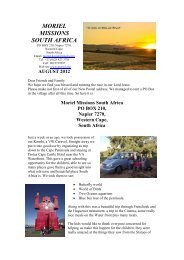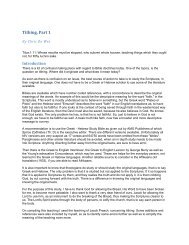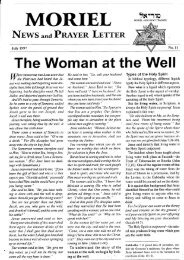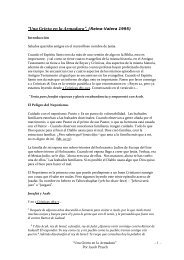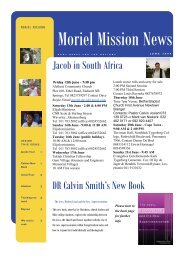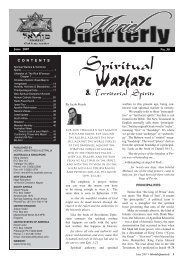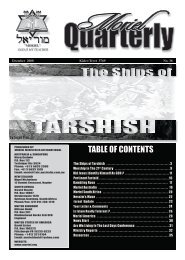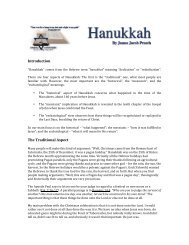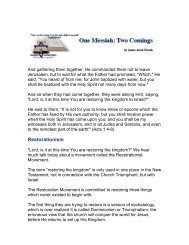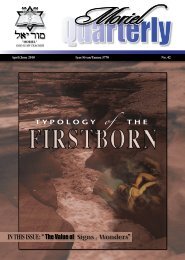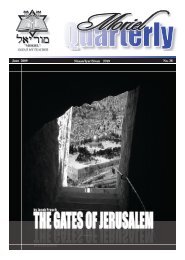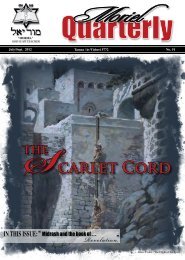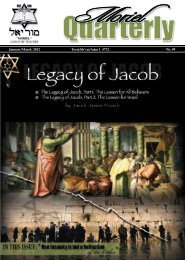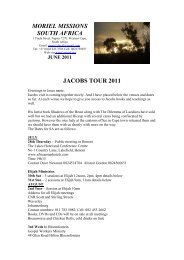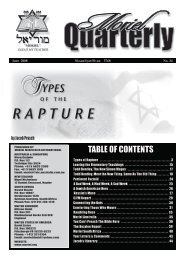The Boiling Pot - Moriel Ministries
The Boiling Pot - Moriel Ministries
The Boiling Pot - Moriel Ministries
Create successful ePaper yourself
Turn your PDF publications into a flip-book with our unique Google optimized e-Paper software.
<strong>Moriel</strong> South Africa<br />
had need. And day by day, continuing<br />
steadfastly with one accord in the<br />
temple, and breaking bread at home,<br />
they took their food with gladness and<br />
singleness of heart, praising God, and<br />
having favor with all the people. And<br />
the Lord added to them day by day<br />
those that were saved.”<br />
I was speaking to someone a while ago,<br />
and they were reminiscing about a church<br />
many years back. <strong>The</strong>y said that at this<br />
particular church the fellowship was sweet<br />
like nothing they have experienced before<br />
or since. In fact over the last few years, I’ve<br />
spoken to quite a few people who have told<br />
me the same thing. In fact I, myself, as a<br />
youth leader in the late 70’s, early 80’s, have<br />
memories which are so sweet; of fellowship<br />
with the crowd I was involved with then.<br />
So is fellowship consigned to the past?<br />
Does it only exist in the nostalgic memories<br />
of a few? Or is there a possibility that fellowship<br />
can be lived and experienced among<br />
believers today? Despite what we see so<br />
often in our churches, despite the apparent<br />
shallowness of some of our relationships, I<br />
believe fellowship is a distinct possibility for<br />
you and I, if we endeavour to do two things.<br />
Firstly – We fellowship to the depth and<br />
breadth which the New and Old Testaments<br />
indicate.<br />
Secondly – We see fellowship as what it<br />
really is; something which needs to be constantly<br />
worked at. I don’t know about you<br />
but I carry baggage that hinders my fellowship;<br />
stuff that I need to let go of if I desire<br />
to grow in this area.<br />
<strong>The</strong> text for today is probably the text<br />
that most people would come up with when<br />
thinking about New Testament fellowship<br />
and that’s why I chose it. For here we see<br />
a group of believers who shared everything<br />
together in those early days straight<br />
after Pentecost. But today I am not going<br />
to exegete that text fully because when one<br />
looks at the original Greek and Hebrew<br />
texts concerning the whole area of fellowship,<br />
we begin to see a lot deeper into what<br />
God desires for us. For example, the word<br />
‘fellow’ in the Hebrew has four uses.<br />
It can just mean man or ‘ish’. ‘Isha’ is the<br />
feminine for woman. It’s a generic term.<br />
Another is ‘Reya’, an associate, an acquaintance.<br />
Another is ‘Amiyth,’ which means a<br />
comrade, a closer word than ‘Reya.’<br />
And finally there is ‘Kawbare,’ which<br />
literally means ‘to be knitted together’ or<br />
intermeshed.<br />
When we look at the Greek we get an<br />
even more in depth look, because it suggests<br />
what we must do or be with our fellows.<br />
In Ephesians 2: 19 it says we must be<br />
‘fellow citizens’ or ‘Soompolytare’. In other<br />
words a native of the same town or faith.<br />
David Royle<br />
In John 11: 16 we are called ‘fellow disciples’<br />
or ‘Soomathetes’. In other words a<br />
co-learner under the same master.<br />
In Ephesians 3: 6 Paul says we are ‘fellow<br />
heirs’ in Christ, in other words we participate<br />
in a common inheritance. ‘Soongklayronomos.’<br />
We are also fellow members<br />
of the body, fellow partakers of the promise.<br />
In 1 <strong>The</strong>ssalonians 3: 2 we are called<br />
‘fellow labourers,’ or ‘helpers.’ It’s the<br />
same Greek word ‘Soonergos,’ a companion<br />
in labor.<br />
In Romans 16: 7 we are called ‘fellow<br />
prisoners,’ ‘Soonaheekmalotos,’ a co-capture<br />
in Christ or for Christ.<br />
In Colossians 1: 7 we are to be found as<br />
fellow servants, ‘Soondoulos’, co ministers<br />
with the same Master.<br />
<strong>The</strong>n in Philemon verse 2 the word suggests<br />
‘fellow soldier,’ ‘Soostiateotare,’ a<br />
companion in battle.<br />
So when we look just at the depth in the<br />
way scripture suggests how you and I are to<br />
interrelate in Christ, we see that even here,<br />
sometimes what we know as ‘church’ pales<br />
into insignificance. But there is one more<br />
‘fellow’ which even makes these fall short<br />
of what I believe God really desires and<br />
that ‘fellow’ is ‘fellow-ship.’ In the Hebrew<br />
we have several words;<br />
<strong>The</strong> first is, ‘Tesoometh’ or to be pledged<br />
together. Secondly we have ‘Yad’ which<br />
means an ‘open hand’ quite literally, and<br />
can be used to both grasp and also smack<br />
if necessary. Thirdly is ‘Kawbar,’ similar<br />
to ‘Kawbare’ and it literally means to ‘be<br />
fascinated’ by one another.<br />
In the Greek it is just as fascinating. Firstly,<br />
‘Soongkoynoneho,’ to share company<br />
with someone. Secondly, ‘Metoche’ which<br />
means ‘fellowship’, but not at a particularly<br />
deep level. But thirdly we have that word<br />
for fellowship, mentioned not just in Acts<br />
2; but in many places. It is a word that lies<br />
at the heart of all relationships – ‘Koinonia.’<br />
Literally to have everything in common.<br />
So let’s look at three points in this word<br />
study, which we will cover over three sermons.<br />
Firstly What is Koinonia? How<br />
could it affect us? That is this session. Secondly<br />
Who and what we have Koinonia<br />
with and who we don’t. We will look at this<br />
in the next session. Thirdly Obstacles to<br />
Koinonia, which will be our final session.<br />
Koinonia, according to Vine is “Communion,<br />
fellowship, sharing in common, that<br />
which the outcome of fellowship, a contribution.”<br />
When we look, at our picture of<br />
the early church in the book of Acts we do<br />
indeed see all these things occurring. Five<br />
in particular which to me stand out significantly<br />
in our text are;<br />
In verse 44 they were together! It is impossible<br />
to have fellowship unless we meet<br />
as an extended family and as Hebrews<br />
10: 25 says “all the more as you see the day<br />
approaching.” It upsets me terribly when<br />
I see the amount of Christians out there,<br />
keeping away from a local church because<br />
of heavy shepherding churches and the<br />
abuses of the word of faith movement and<br />
other heresies. I understand, I sympathise,<br />
even empathise BUT someone once said<br />
and I agree, ‘<strong>The</strong> answer to bad church is<br />
not no church, but good church.’ But these<br />
believers were together.<br />
Again in verse 44, they had all things<br />
in common. Now let me make a point here<br />
because this is where quite a few churches<br />
go wrong. You see when we look at other<br />
contemporary groups of the time, we see<br />
some living lifestyles in a similar way to<br />
communes. <strong>The</strong> Qumran documents show<br />
clearly that the Essenes and the Qumran<br />
sects lived in a similar fashion; being together<br />
and having all things in common. In<br />
Acts 4: 32 – 5: 11 though, it clearly shows<br />
that the selling of possessions was voluntary,<br />
and the fact that the Christians moved<br />
from house to house in verse 46 shows that<br />
the Christians were distinct from the communes<br />
from the time. In fact what it does<br />
mean is that to hold together and have<br />
things together does not mean you join a<br />
Kibbutz or a commune; what it does mean<br />
is that even though you may own land,<br />
things, finances, a cricket bat, lawn mower<br />
– whatever, we can make them available<br />
to the community of believers if there is a<br />
need. In other words if you have 2 coats,<br />
food, whatever you should share with who<br />
ever has none. 600 years ago the welfare<br />
system of society was ‘<strong>The</strong> Church’. Justine<br />
the Apostate, enemy of the Church, said<br />
“<strong>The</strong>se followers of Christ, they not only<br />
look after their own poor, they look after<br />
ours as well.” When we look at some of the<br />
Great welfare movements of all time with<br />
people such as Shaftsbury, Muller, Barnado<br />
etc, we see that it was always the Christian<br />
at the forefront. We see that the Church<br />
played a prominent role. In the UK after<br />
the 1 st and 2 nd world wars, we see a Paternal<br />
state taking the place of the Church. And<br />
now as these systems become so expensive<br />
to maintain and institutionalize, we see the<br />
failure of the state and people untouched<br />
and adrift in poverty. In our society, times<br />
are economically difficult and I believe<br />
once again the fellowship of believers must<br />
fill the GAP as we see brothers and sisters<br />
in terrible need, children orphaned, as we<br />
see an HIV pandemic shattering lives and<br />
families. We must respond in Christ’s love.<br />
Verse 46 says they had one mind, one<br />
accord, in the temple. <strong>The</strong>ir act of worship<br />
was an act of unity, and this overflowed into<br />
their very houses because… It goes on to<br />
say they broke bread from house to house,<br />
even taking their meals together with glad-<br />
12 <strong>Moriel</strong> Quarterly • June 2012



